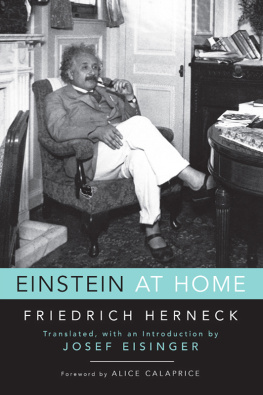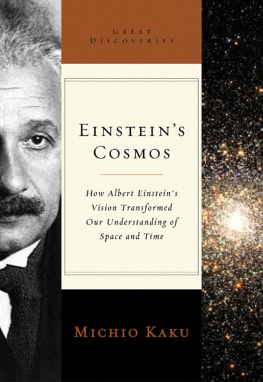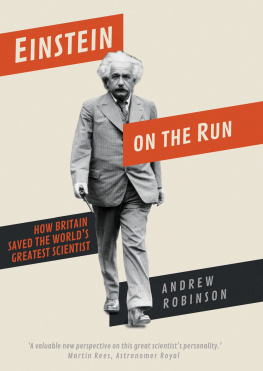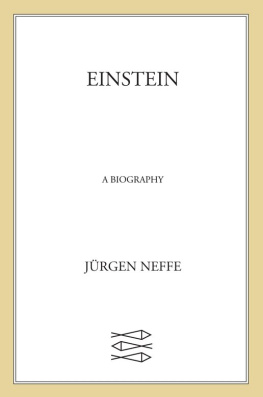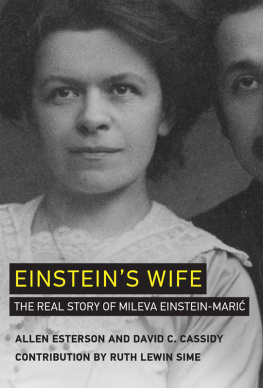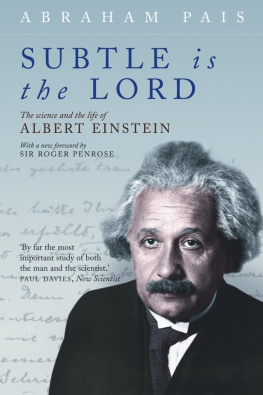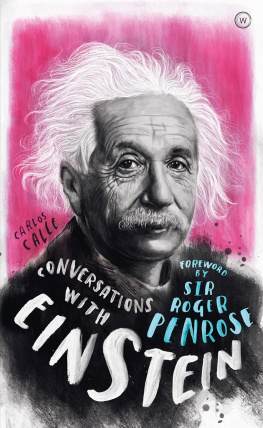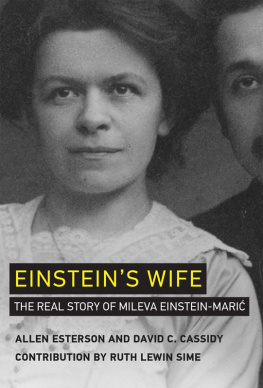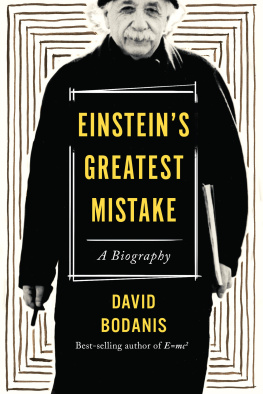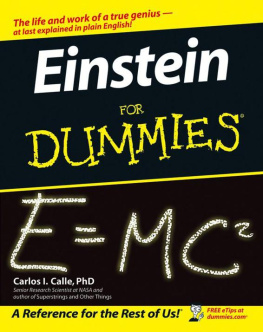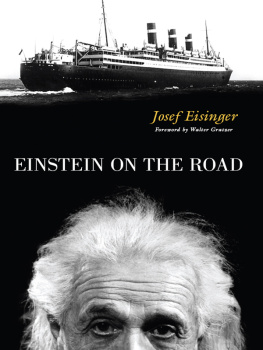
I am grateful to Mr. Uwe V. Lobeck, the Director of the Friedrich Herneck Archive in Dresden, for supporting this project and for giving permission to publish this translation of Herneck's book Einstein privat. I thank him also for making some of its illustrations available for the present volume.
I am indebted to Professor Dieter B. Herrmann for contributing the essay about Friedrich Herneck that appears in translation as . I am also grateful to him for helping me make contact with the Friedrich Herneck Archive and for his unremitting encouragement and advice.
I am grateful to my friend and experienced Einstein biographer Alice Calaprice for contributing a foreword and for her unstinting advice. My thanks also to Barbara Wolff of the Einstein Archive at the Hebrew University, Jerusalem, for her kind cooperation. I am indebted to my editor, Steven L. Mitchell, for several helpful discussions and suggestions, and to my editor, Sheila Stewart, for her intelligent and proficient copyediting. Finally, my special thanks to Dr. Frank Mecklenburg of the Leo Baeck Institute, New York, for his cooperation and his benevolent support.
Many thanks, also, to Lesley Wyle for her archival research, to Alison Eisinger for copyediting portions of this book, and to Simon Eisinger, who sifted through the available literary, photographic, and architectural evidence in order to reconstruct the likely layout of Einstein's Haberlandstrasse apartment. My warm thanks, finally, to my wife, Styra Avins, for being such a good mate for more than fifty years.
J. E., New York, 2015.

Calaprice, Alice. The Einstein Almanac. Baltimore: Johns Hopkins Press, 2005.
Eisinger, Josef. Einstein on the Road. Amherst: Prometheus Books, 2011.
Flsing, Albrecht. Albert Einstein: A Biography. Translated by E. Osers. New York: Viking, 1997.
Frank, Philipp. Einstein: His Life and Times. New York: Knopf, 1947.
Grundmann, Siegfried. Einsteins Akte: Wissenschaft und Politik-Einsteins Berliner Zeit. Berlin: Springer Verlag, 2004.
Highfield, Roger, and Paul Carter. The Private Lives of Albert Einstein. London: Faber and Faber, 1993.
Hoffmann, Dieter. Einstein's Berlin: In the Footsteps of a Genius. Baltimore: Johns Hopkins University Press, 2013.
Isaacson, Walter. Einstein: His Life and Universe. New York: Simon and Schuster, 2007.)
Kershaw, Ian. Hitler, 18891936: Hubris. New York: W. W. Norton, 1998.
Levenson, Thomas. Einstein in Berlin. New York: Bantam Books, 2003.
Moore, Walter. Schrdinger: Life and Thought. Cambridge: Cambridge University Press, 1989.
Neffe, Jrgen. Einstein: A Biography. Translated by S. Frisch. New York: Farrar, Straus & Giroux, 2005.
Pais, Abraham. Einstein Lived Here. Oxford: Clarendon Press, 1994.
. Niels Bohr's Times. Oxford: Clarendon Press, 1991.
. Subtle Is the Lord The Science and the Life of Albert Einstein. Oxford: Oxford University Press, 1982.
Rowe, David E., and Robert Schulmann, eds. Einstein on Politics: His Private Thoughts and Public Stands on Nationalism, Zionism, Peace, and the Bomb. Princeton: Princeton University Press, 2007.
Stern, Fritz. Einstein's German World. Princeton: Princeton University Press, 1999.

Elsa Einstein, Albert's wife, must have been in an uneasy frame of mind as she headed for the employment agency in Berlin's Jgerstrasse, that morning in June of 1927. She had had little luck with domestic servants, but the departure of her latest housekeeper had been the last straw: Not only had the woman left her job without giving notice but she had taken several pieces of the family silver with her. For the wife of a world-famous scientist who is obliged to host many dinner parties and other social gatherings, it loomed as a calamity. But lo, this was to be Frau Elsa's lucky day! At the agency she met the twenty-one-year-old Herta Schiefelbein, who had come to look for a new position. The two women struck up an immediate rapport, and together they went to the Haberlandstrasse where Herta was shown the Einsteins apartment. They agreed on terms of employment, and by lunchtime Herta was preparing lamb chops and green beans for the Einstein family, a dish that Albert pronounced the tastiest he had ever eaten.
This is how Herta came to join Einstein's household. Before long, she was a quasi-member of the family, which included Einstein's two stepdaughters and their husbands. She was cherished by them all, and she lived in their midst until 1933, when Hitler's accession to power compelled the Einsteins to forsake their two domiciles in Berlin.

Leaping fifty years into the future, we meet Herta again, in conversation with Friedrich Herneck, a historian of science, who had invited her to The year is 1978, and their five conversations take place at Herta's home in East Berlin, at the time the capital of the German Democratic Republic (DDR), or East Germany. In the five intervening decades, Herta Schiefelbein had marriedshe is now Herta Waldowand had raised a son; Europe had been ravaged by the Nazis and by war, and the house in the Haberlandstrasse had been reduced to rubble in a bombing raid; but Herta's intelligence is as keen as ever, and her recollections of her life with the Einsteins are still vivid.
Herneck, her interlocutor, had a somewhat enigmatic past that reflects the political upheavals of twentieth-century Europe. After serving in the Wehrmacht in a noncombatant role, he found himself at war's end in a Russian prisoner-of-war campwhether he defected or was captured is unclear. There he became an ardent Marxist, and, as an experienced stage actor and effective speaker, he was soon employed by his Soviet captors to re-educate his fellow prisoners. Following his release, Herneck lectured on dialectical materialism, the official Marxist philosophy, in various schools run by the DDR's Socialist Unity Party (SED), and finally at Humboldt University in Berlin where his coursethree lectures a weekwas mandatory for all students. East Germany was in those days an authoritarian state, and its citizens were indoctrinated in Marxist teachings from an early age. Although Herneck supported his country's political system, he remarked in his lectures on certain logical flaws in the official doctrine, and eventually this came to the attention of the authorities. Herneck was accused of revisionism (questioning the official dogma) and was abruptly relieved of his teaching duties. Thanks to the intervention of an influential friend, he was permitted to work on the history of science and was, in time, rewarded with a professorship in Berlin. Herneck's scholarly interests were centered on the lives of notable nineteenth- and twentieth-century scientists, on their contributions and their philosophy, and he is the author of a number of carefully researched biographical books, several of them devoted to Einstein. But his work, published in the DDR, is little known in the West.

provide background information and brief biographies of the persons mentioned in the conversations.
Herneck's chief purpose was to draw out Waldow's recollections of her life with the Einsteins, and to convey thereby the atmosphere that pervaded their home. Waldow, for her part, perceived Einstein not as the celebrated scientist but as a kind and generous employerthe best she had encountered. She recalls how respectful and solicitous he always was toward her and her family, and how readily he was given to hearty laughter. We discover Einstein's favorite foods (heading the list are strawberries), what he liked to wear, his smoking habits, and who used to cut his hair; we also learn a good deal about Einstein's relationship with Elsa and with his women friends, and what provoked the occasional rows with Elsa. Waldow's story also reveals the enormous importance of music in Einstein's daily life, and we learn of his empathy with animals, specifically with a dog, a cat, and a parakeet. (Later on, in Princeton, he lived with a dog, numerous cats, and a parrot.) In short, Waldow gives us a pretty good idea of how Einstein spent his days in Berlin, from breakfast to nightparticularly when her story is combined with Einstein's diary, in which he records his activities during a two-week period in 1931 (see , the section titled Two Weeks at Home).
Next page
